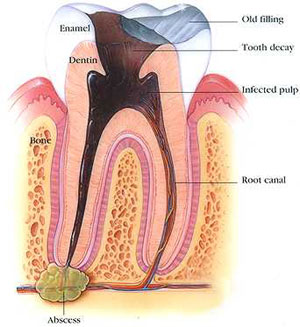With their more sophisticated procedures, dentists are helping people keep their teeth longer. Because people are living longer and more stressful lives, they are exposing their teeth to many more years of crack-inducing habits, such as clenching, grinding, and chewing on hard objects. These habits make our teeth more susceptible to cracks. Continue reading
Tag Archives: cracked tooth
Nerve Damage Symptom in Teeth
When infection damages the nerves inside the teeth, the symptoms are easy to notice and often painful. But that’s a good thing, because untreated nerve damage can lead to severe pain and even tooth loss. Dental surgeons can fix the problem before it becomes serious, so knowing when you have nerve damage can help you avoid its complications.
What is a tooth nerve?
The oral cavity is made up of an average of 32 to 36 teeth. Each tooth has its own function: grinding, masticating, cutting, shearing, and so on. The tooth nerve is called and referred to as the dental pulp. It is a complex organ composed of connective tissues, blood vessels, and nerve axons. It is pinkish in color and soft in nature. Its original function is in the development of and formation of the teeth themselves. These nerves are relatively large at a young age, but they slowly shrink and become narrow over the years of adult life. They serve the purpose to keep the teeth hydrated and allow the dentin to retain a certain amount of elasticity. It lies within the tooth and extends from the crown to the tip of the root in the jaw bone.
All about tooth sensitivity: Part 1

Tooth sensitivity
Tooth sensitivity is a common dental condition where the teeth becomes extremely sensitive to hot and cold, leading to tooth pain. It affects quite a number of adults, sometimes affecting their lifestyle where certain food with extreme temperatures such as ice-cream or hot coffee needs to be taken cautiously or in some cases, avoided completely.
Cause of tooth sensitivity
Tooth sensitivity occurs due to the exposure of dentinal tubules layer of the teeth which is usually protected by enamel. There are a range of factors that can contribute to dentine exposure, such as tooth grinding, broken tooth, tooth erosion, defective tooth filling, tooth whitening, tooth straightening, dental crown or bridge work and so forth. These are explained as followed: Continue reading
Alternatives to endodontic treatment
General information about endodontic treatment
Endodontic treatment is a common dental procedure that removes damaged living tissue called “dental pulp” from inside the root canals of a tooth. The pulp contains blood vessels and nerves. It is often referred to as root canal treatment or root canal therapy.
Sometimes, the pulp inside the tooth becomes infected by bacteria or damaged by a traumatic injury to the tooth. However, the most common cause of pulp death is a fractured or cracked tooth and deep tooth cavity which can expose the pulp to the bacteria found in saliva. This can result in inflammation, infection and, eventually, necrosis (pulp death).

